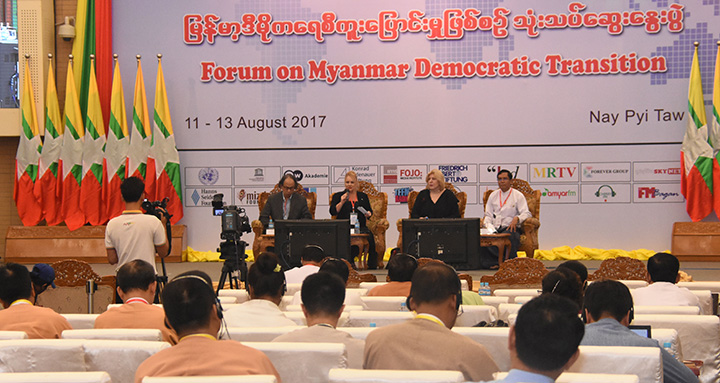Myanmar Times editor and executive director Kavi Chongkittavorn recently explained his job in a way that made it sound a little bit like he’s in the business of producing political propaganda. Here, he offers some clarification.
“What is the role of media under the current government?” Myanmar Times editor Kavi Chongkittavorn posed this question to himself during a panel discussion at the Forum on Myanmar Democratic Transition, which ran from August 11 to 13.
His answer: “The most important [role] is constructing the Myanmar narrative.”
“You read Aung San Suu Kyi’s comments, you read New Light of Myanmar, you read everything that comes from the government. The government wants to construct the Myanmar narrative, which is still absent,” Chongkittavorn said. “You need a massive [number of] people to believe the same thing.”
Netizens promptly accused the editor of extolling the enterprise of political propaganda. Among the critics were journalist Fiona MacGregor, who was fired from the Myanmar Times in October 2016 under pressure from the Ministry of Information for reporting on alleged rapes committed by Myanmar troops in Rakhine State.
It is “worrying that this is the level of debate we are seeing at such a crucial time for media freedom,” she wrote on Twitter, apparently alluding to the arrest and prosecution of six Myanmar journalists over the last three months.

Journalist Sean Gleeson, who reported on the government’s role in MacGregor’s firing, joined the chorus, taking issue with Chongkittavorn’s offering of Singapore as an example for Myanmar to emulate.
“Singapore is the only country that has been successful in generating a national narrative,” Chongkittavorn said at the forum. “Singapore can overcome any adverse criticism – coming from everywhere, even from the outside world. The government is clear about its agenda, Channel News Asia, Straits Times Group, it has the same focus. That is why it is successful in creating a very strong national narrative. Myanmar needs this now and needs it very urgently.”
Singapore is ranked 20 places below Myanmar by the World Press Freedom Index due to its government’s tight regulations on media content production and distribution, which are widely known to result in self-censorship.
To be fair, Chongkittavorn also said at the forum that access to information by both journalists and the public is essential to Myanmar’s transition and that information should come from a diversity of sources. But his other comments warrant explanation, which he sent to Coconuts via email yesterday:
“At the forum, I mentioned that Singapore was the successful country to have a national narrative. I just gave an example. I have never advocated this country’s model. Myanmar’s media landscape is unique and more diverse, different from Singapore. Myanmar journalists question more and some do critical reporting. Independent media in Myanmar can construct narratives that are inclusive [of] views from all stakeholders. It will take time.
“I am still new to Myanmar Times and I am still learning – a very high learning curve. One thing is clear between the state-owned media and the Myanmar Times: our editorial team has our own views.”
Chongkittavorn, it’s important to note, was brought in to the Myanmar Times following a career as a respected journalist and educator in Thailand to raise the publication out of disrepute after its leadership was taken over by government loyalists last year.
“Former staff members and others believe he offers the best hope of turning around the paper’s flagging fortunes,” Gleeson wrote for Frontier in February. “It will be a momentous challenge.”





Reader Interactions